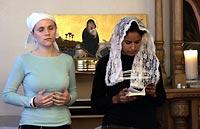Coptic oasis in U.S. desert

NEWBERRY SPRINGS, Calif. — Down an unpaved road, past brooding icons and swaying stands of mesquite, lies St. Antony's Monastery, a place of scorching winds and emptiness that perhaps only a holy man could love.
Little moves when the sun is high, but as the day wears on, figures emerge from solitary rooms. These shrouded men, most from Egypt, are practicing the oldest monastic tradition in Christendom and tending its sole outpost in North America.
They spend days and night in prayer, seeking a mystical union with the divine.
"The desert gives you a great calmness of heart," said Father Antonious Saint Antony, one of 10 monks living here.
Despite its remoteness, this 800-acre swath of the Mojave 25 miles northeast of Barstow has become a magnet for thousands yearning for lives shunning materialism, embracing poverty, denying the self.
Like the monks, most visitors are Coptic Orthodox. The faith dates to about A.D. 60, when tradition says the Apostle Mark founded the church in Egypt.
Cherie Anderegg, 22, a Coptic convert from La Habra, Calif., was here on a retreat. Attending a large, nondenominational church had left her unsatisfied. One night she and her boyfriend went to a Coptic service where the priest read the entire book of Revelation.
"We felt they were right, that this was the way Christ had set up the church," she said. "This church has not changed since it started."
Father Anastasi Saint Antony is the leader, or abbot, of St. Antony's Coptic Orthodox Monastery. A soft-spoken man with a ready smile and serene demeanor, he wears the traditional garb of a Coptic monk — black robe and black hood — and has a long, untrimmed beard. Like the others, he goes by the last name Saint Antony.
"We are here to have a quiet life and unite with God; there is no other reason to be here," he said. "I came because I felt I was distracted. I could not concentrate on the verse in the Bible that says you are to love the Lord your God with all your heart, all your soul and all your mind."
The monks trace their spiritual roots to St. Antony, who retreated into the Egyptian desert about A.D. 285 for an ascetic life of religious contemplation. Others followed and became known as the Desert Fathers.
Monastic life here is rigorous, physically and mentally. The monks take vows of poverty, chastity and obedience and focus entirely on worship. They pray for hours daily, reciting Scripture from memory and repenting of their sins.
Though they eat and sometimes pray together, much of their life is spent alone in tiny rooms they call cells, each with only a bed and a chair. Sometimes they stay in desert shacks topped with small crosses.
"Every person has two struggles: the spiritual attacks from outside and the attacks from within," said Father Markos Saint Antony. "Here we have only one fight, the fight within. We have eliminated the outer struggles."
The monks begin their day at 3:30 a.m. in a red-carpeted church with gold-framed icons on the walls. Relics and bone fragments from saints sit in cases up front, where they are kissed by devotees.
Bleary-eyed visitors drag themselves in but don't sit. No one sits during the liturgy, which can last three hours.
The service is in English, Arabic and Coptic, a language blending ancient Egyptian with Greek. Like a choreographed play, the monks chant their parts, drawing out certain vowels, then everyone chants in unison. The rhythmic recitations, clouds of incense and dim glow of oil lamps create an otherworldly effect.
Afterward, the monks take the morning cool as a chance to work. Each has a job. Some cook, maintain the books or create mosaics and paintings. One puts out a magazine that goes to Coptic churches around the country.
The rites continue periodically throughout the day, ending about 11 p.m.
The monastery, dedicated in 1989, was built here because of its isolation, though it's within driving distance of at least 23 Coptic congregations in Southern California.
On religious holidays, thousands bring food and supplies to the monks, who don't get paid and rely on donations.
With its wooden buildings and careworn trailers, St. Antony's can't compare with the immense history, artistry and old stone monasteries of Egypt.
But it makes no difference to the monks.
"The place may change, the desert may change, but God remains the same," said Father Moussa Saint Antony of Egypt. "And wherever I can be with God, I am happy."
